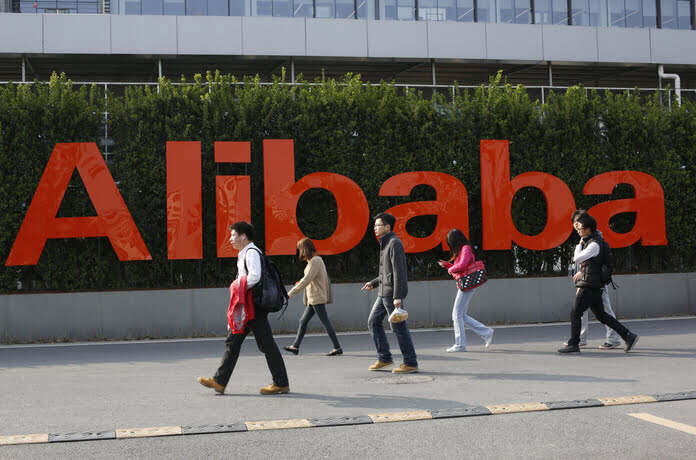Alibaba Stock (NYSE:BABA)
As a result of a statement made by the firm not so long ago, the share price of Alibaba has recently reached an all-time high. Alibaba’s announcement that it would reorganize its commercial entities into two primary divisions, the Alibaba Business Group, and the Ant Group, came as a complete surprise to the business world. Many industry professionals believe that this move has the potential to unleash significant value for the company, and they point out that it is an unprecedented shakeup.
As the Chinese technology giant Alibaba announced that it would split itself into six companies, setting the stage for its subsidiary businesses to go public, the stock of Alibaba (NYSE:BABA +14.46%) was on course to have its best day in several months.
Akin to Alibaba (NYSE:BABA) The firm, which is one of China’s largest and most important businesses, stated that the move, which involves transitioning from conglomerate to holding company status, is aimed to unleash shareholder value and boost market competitiveness. It is a nod both to investors who have weathered years of losses for the stock—caused largely by regulatory pressures—as well as regulators who have been hammering Alibaba and the rest of the Chinese tech sector over competition concerns since late 2020. The losses for the stock were caused primarily by regulatory pressures.
What Exactly is the Alibaba Group of Companies?
Tmall, Taobao, and Alibaba.com will all fall under the purview of the Alibaba Business Group, which will be responsible for Alibaba’s online retail operations. Also, the group will be responsible for overseeing Alibaba’s new retail projects, such as Tmall Supermarket, Freshippo, and Hema. In addition, the team will concentrate on innovation and the development of new businesses, particularly in the areas of cloud computing, logistics, and local service provisioning.
Alibaba has announced that it will transform into a holding company consisting of the following six divisions: a high-growth cloud computing and intelligence group, which will include Alibaba’s work in artificial intelligence; a global digital commerce arm; a division focused on digital media and entertainment; a local services business; the Cainiao smart logistics division; and Taobaba and Tmall, which are Alibaba’s core Chinese e-commerce operations.
With the exception of Taobao and Tmall, which will continue to be entirely owned by Alibaba, all six units will have the ability to seek initial public offerings and attract financing from other sources. In addition to continuing in his role as president of the cloud division, which he assumed in December, Daniel Zhang will continue to serve as chairman and CEO of the holding company. Each of the other divisions, however, will be given its own CEO and board of directors.
According to Zhang, who was quoted in a statement, “the market is the finest litmus test,” and each business group and firm has the ability to seek independent fundraising and IPOs when they are ready. At the age of 24, Alibaba is excited to take advantage of a fresh prospect for business expansion.
The Alibaba-owned South China Morning Post first reported that Alibaba shares would continue to be listed in New York and Hong Kong. However, a reference to the company’s listing was later removed from the story.
American Depositary Receipts (ADRs) of Alibaba that are listed in the United States increased by more than 11%, putting the stock on track for its highest performance since the beginning of January.
Analysts at Citi led by Alicia Yap wrote in a note that this restructuring most likely has been in the works for some time. They pointed to changes in how Alibaba reports on its existing business segments and Zhang’s recent move to the top of the cloud unit as evidence of this. Yap is leading the team of analysts. Yet, according to the analysts at Citi, this information comes as “an earlier-than-expected surprise.”
“While it may still take some time for each business unit to go through the separate fundraising activities, and whether the holding group will retain the consolidated stake or de-consolidated stake of the business unit following the separate listing remain unclear, we believe investors will reassess the valuation of each business unit,” Yap said. “While it is unclear whether the holding group will retain the consolidated stake or de-consolidated stake of the business unit following the separate listing, we believe investors will reassess the valuation of each business unit.”
Alibaba is a large technology corporation that began as an e-commerce company that was started as a startup by Jack Ma in 1999. Alibaba now has interests ranging from domestic internet retail in China to an artificial intelligence unit that is constructing a competitor to ChatGPT.
Setting its units up for a life beyond Alibaba’s full control makes the group the latest conglomerate to split itself up in recent years. General Electric (GE), Johnson & Johnson (JNJ), and Toshiba (6502.Japan) have all done the same thing. Alibaba is the latest conglomerate to set its units up for a life beyond Alibaba’s full control.
According to Thomas Hayes, chairman of Great Hill Capital, which is an investor in Alibaba and has a stake in the company, “this is very favorable for shareholders.” “This will enable the sum of the parts’ valuation to be realized more quickly—as faster expanding business divisions will ultimately be awarded considerably greater multiples by the market when they are either spun to shareholders or offered in an initial public offering.”
There may also be repercussions from a regulatory standpoint. Although Alibaba’s stock reached its highest level in a month on Tuesday, moving above $96 per share, the market value of the business has decreased significantly since late 2020, when its stock was trading for more than $300 a share. The organization has been the focal point of attention from Chinese regulators, who have been cracking down on the rapidly expanding technology sector in the country due to worries about data security and the threat of increased competition.
“Six tiny pieces will fly under the radar as opposed to one monster as a continual target,” said Hayes. “[T]here is a significant difference between the two.”
Although Alibaba may have prioritized releasing money for its shareholders, the independence from additional regulatory restrictions may prove to be the incalculable benefit of splitting up the company.
What are the Potential Dangers?
There are still dangers involved with investing in Alibaba, despite the excellent news that has been released. The corporation is still being investigated for antitrust violations and is under heightened attention from regulatory authorities, both of which may have a negative effect on the company’s business operations. However, the continuous tensions between China and the United States can have a detrimental effect on Alibaba’s operations as well.
The share price of Alibaba is currently seeing a substantial spike as a result of an unprecedented shakeup that has the potential to liberate a significant amount of value for the company. Investors view the restructuring of Alibaba’s business units as a positive move, and many industry experts believe that it may continue to drive the stock price higher in the weeks and months ahead as a direct result of this restructuring. Despite this, there are still potential dangers.
Featured Image: Megapixl © Minipig5188















